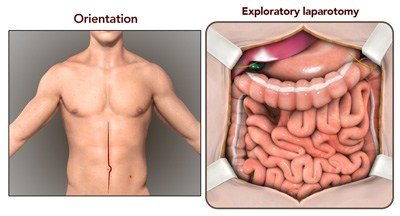Laparotomy

What is laparotomy?
Laparotomy or exploratory laparotomy is a procedure performed to examine the organs of the abdomen and diagnose any underlying conditions. The different organs that can be examined through laparotomy include the liver, intestine, gallbladder, pancreas, spleen, stomach and kidneys.
How do I prepare a laparotomy?
Before a laparotomy, your doctor will perform a thorough examination of your condition and overall health to determine if you will be able undergo the surgery. Your medical history and your regular medications are reviewed. You will be advised on the medicines that are safe to take before the surgery and those that you need to avoid. Quit smoking and alcohol several weeks before the procedure to avoid complications. You will be informed about when you should stop eating and drinking on the day of the surgery.
What are the indications for laparotomy?
Laparotomy is performed when imaging tests such as X-rays and CT scans do not provide an accurate diagnosis of conditions such as gallstones, inflammation of the appendix, pancreas or intestine, liver abscess and perforations in the intestine.
How is a laparotomy performed?
Laparotomy is performed under general anaesthesia. Your doctor makes an incision on your abdomen at an appropriate position to view the underlying organs. In some cases, the condition can be treated at this stage itself or a biopsy can be taken for further examination.
What can I expect after laparotomy?
Following laparotomy, you will be monitored in a recovery room. Pain medication will be prescribed to keep you comfortable. You are encouraged to walk as soon as you can, and will be taught breathing and leg exercises.
Describe the stages of recovery and care plan.
Depending on the severity of your condition, your surgeon will decide on how long you will be hospitalised. You will be able eat and drink normally 2 to 3 days after the surgery. It may take you about 4 weeks to completely recover from surgery.
You are advised to rest for two weeks, and follow a modified diet and exercises designed by your doctor before your discharge. Contact your doctor immediately if your wound becomes tender, inflamed or starts to discharge.
What are the potential complications of laparotomy?
As with all invasive procedures, laparotomy may be associated with certain risks such as bleeding, damage of the surrounding organs and infection.
What is the cost of the procedure?
We will provide you with a full explanation of the costs of the operation to assist you in your decision to proceed. The costs will vary depending on your level of private health insurance.






